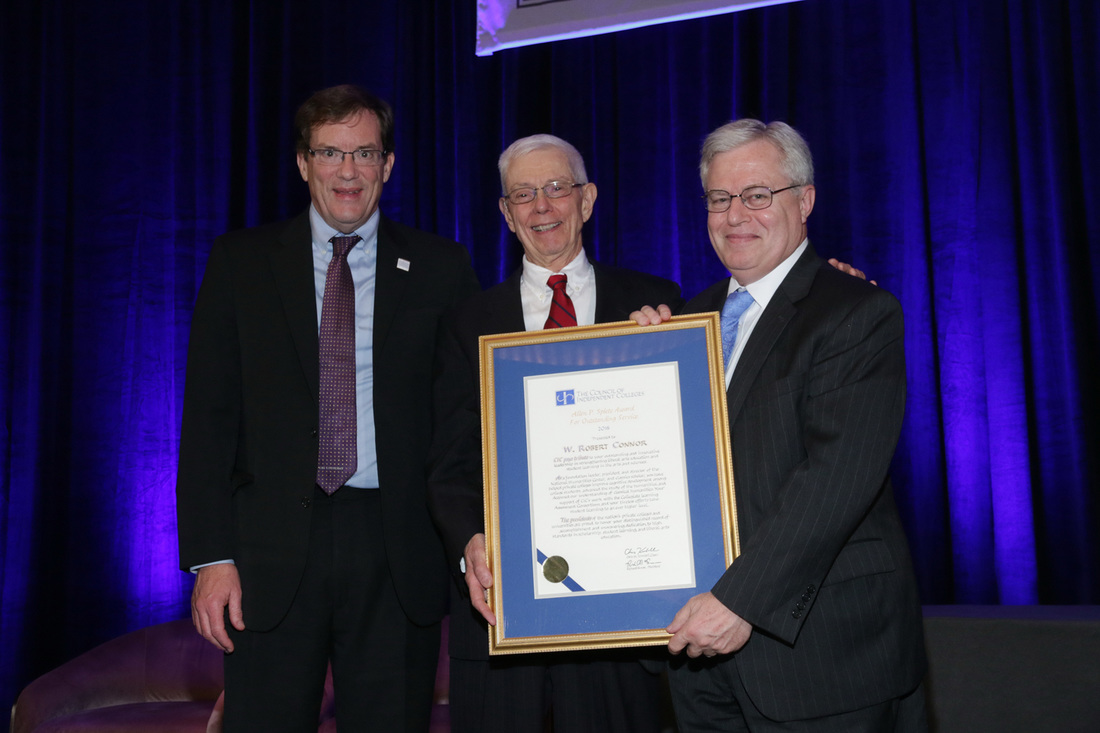Imagine! Unlikely things really do happen. The Council of Independent Colleges gave me the Allen P. Splete Award for Outstanding Service, and asked me to speak for ten minutes or so to the several hundred college presidents and spouses gathered at its award banquet. As it turned out I was the fifth and final speaker in the award ceremony. As the evening wore on, my voice wore out, so I decided to cut my remarks drastically. But here is what I would have said, had time and laryngitis allowed.
--
Over the past year things have turned rancorous, not only in American politics but on many college campuses. In fat, the job definition of many a college president has changed, without any notice or discussion. It’s no longer enough to keep the seats filled with good students, balance the budget, build the endowment, pour concrete, and have a winning record in all sports. Something new has been added.
Colleges have become the stage on which the American Dream is now acted out. It’s the old script - equal opportunity for all, economic well-being, harmony across racial and other divides. On campus that translates into generous financial aid, a student body that “looks like” America, and readiness for a good paying job immediately upon graduation. Colleges are expected to provide what we rarely experience in our neighborhoods or at work - genuine diversity, with differences honestly expressed and freely discussed without anyone’s feelings being hurt. A robust understanding of the First Amendment is expected to coexist with harmony across gender, racial and sexual divides.
The media tell us that Americans are losing their belief in the American dream. I don’t think that’s true. We have simply transferred that dream to college campuses. The further society gets from the dream, the greater the expectation that colleges will, symbolically at least, make it happen. They will heal the wounds and assuage the pain. The more clearly we realize that America has not yet shaken off the long legacy of slavery, and discrimination in all its vicious forms, or solved its economic problems, the more intense the insistent that any painful reminder should be removed from college campuses - statues, murals, names on buildings, the title ‘master,’ any word or image that might trigger hurtful memories. At the same time, nothing must be allowed to deny or obscure past injustice.
The contradictions are flagrant, but the expectations are high. The new job description for college presidents seems to demand that you create for each student on campus the American dream we seem to be losing out there in the “real world.” In this fantasy-land you are the impresarios, the illusionists; the more persistent racial animosity, the more extreme the hollowing out of the economy, the uglier political discourse, the more intense the demand that each college president wave a wand and whisk away all the contradictions, fears and disappointments. I don’t envy you!
Sometimes symbols can substitute for reality and make contradictions seem to to disappear – but only temporarily, of course. No magic can erase the past or ensure a better future.
The ‘real world,’ as we call it, does not waste much time on such fantasies. Work has to get done - if you are lucky enough to find it. Meantime, wealth concentrates; wages stagnate; glass ceilings turn out to be made of permafrost. Jobs get exported, while job-eating technology crawls higher and higher up the corporate ladder. The work that remains can be soul-destroying, but it’s sink or swim out there. Feelings get hurt but you better pick yourself up and get on with it … or else.
It does no good to tell students this. They know it, often first hand, not from reading reports or watching TV. Indeed, it is that knowledge, I believe, that drives the discontent we have been seeing on so many campuses. That is what is changing your job description. “Please,” they are saying, “for a few years let us dream.”
There, it seems to me, lies opportunity. It’s a chance to re-write your own job description. This is the moment, I believe, to take hold of fears and dreams and make them into what we have come to call ‘a teachable moment.’ Because, look, behind the rhetoric are powerful, persistent questions, about how societies change, how they understand and commemorate the past, what is the role of art, what is to be discovered in that grey area between heroes and villains, where most of us live? How much is determined by brute economic forces, and how much of a difference can an individual make? What does it take to be an effective agent or change? What do we mean by success; what values shape that definition; where can we find true satisfaction? You see where I am heading. These are the contemporary version of the recurring questions in any true liberal education; they are the questions that can turn us where Socrates insist we must head, to the examined life, without which life is not worth living.
That job description means finding ways to help students, all of them, to cut through the rhetoric and to dig down to their core values, and then muster the courage to live by them. All this, I believe, is alive and well, kicking and screaming maybe, on your campus, waiting for the leadership that can make possible a transformative, liberating education.
I realize that’s a tall order. But it is not a new job description. It’s a very old one, and that is good news, because from Socrates to your colleagues here at CIC you have allies who can and will help you. And a lot of us on the sidelines are cheering for you.

 RSS Feed
RSS Feed
